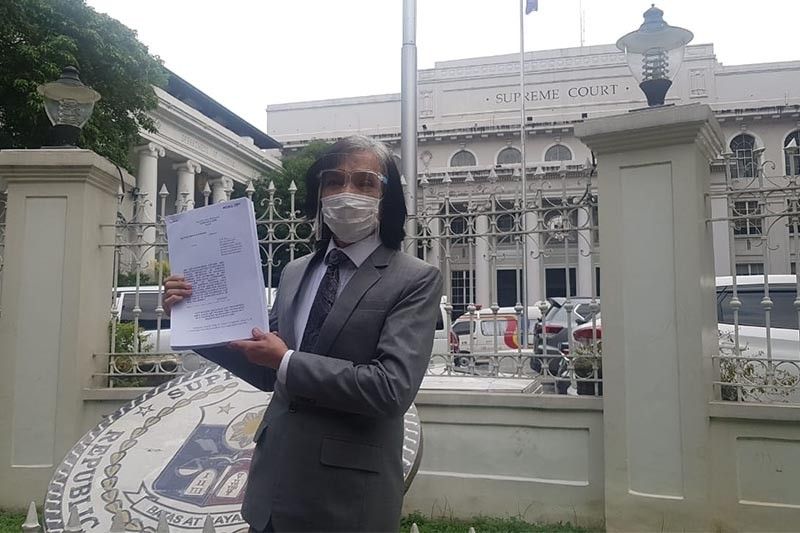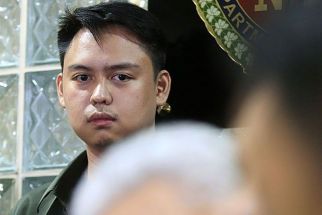Fifth petition alleging violations on bill passage vs anti-terror law filed

MANILA, Philippines — The former corporate government counsel of President Rodrigo Duterte asked the Supreme Court to strike down the divisive Anti-Terrorism Act of 2020 as unconstitutional over supposed violation of Congress in passing the bill.
Former Office of the Government Counsel chief Philip Jurado is the fifth petitioner against the new anti-terrorism law. He also asked the high court to issue a temporary restraining order against the implementation of Republic Act 11479.
The SC, in a full court session on Tuesday, consolidated the previously filed four petitions from law experts and lawmakers and ordered the government to answer them in ten days.
Duterte appointed Jurado to the OGCC in April 2017, but fired him on May 2018 over a legal opinion that the chief executive described as a “stupid proposition.”
He named the Cabinet members designated as Anti-Terrorism Council, Executive Secretary Salvador Medialdea, Armed Forces of the Philippines’ General Felimon Santos Jr., Philippine National Police’s Gen. Archie Gamboa, the Senate and House of Representatives as respondents in his petition.
Jurado said he impleaded both Houses of the Congress due to their alleged violation of the Constitution mandate in passing a bill.
RELATED: As soon as SC opens, law professors fire petitions vs anti-terrorism law | Lawmakers join academe in assailing anti-terrorism law before SC
Question on procedural aspects of the bill passage
Jurado pointed out in his petition that the Constitution put a “qualified exception” on when the president may certify a bill’s immediate enactment that is “when the President certifies to the necessity of its immediate enactment to meet a public calamity or emergency.”
The Constitution holds that no bill passed by the Congress shall become a law unless it has passed three readings on separate days, but when a president certifies the passage of a bill as urgent, the bill becomes exempt from this rule. The proposed legislation may be approved on second and third readings on the same day.
In Duterte’s letter to the House Speaker Alan Peter Cayetano, the president certified the bill as urgent to “address an urgent need to strengthen the law on anti-terrorism.
“Needless to say, strengthening the law on certain matters, such as terrorism, which matters are already covered by existing laws, ie. Human Security Act of 2007), cannot be considered as public calamities or emergencies. Otherwise, all amendatory laws should be deemed as public calamities and emergencies,” Jurado said.
Questions sections on pre-trial detention and definition of terrorism
Like previously filed petitions, Jurado also questioned the constitutionality of Section 29 of the law that allows the detention of a suspected terrorist of up to 24 days before bringing him to judicial authority.
This provision, the petition argued, “allows the ATC to waive the application of Article 125 of the Revised Penal Code, even when such waiver is vested solely in the hands of the detainee—the person to whom the right, which is to be waived, is actually vested.”
Art. 125 of the RPC states that a person detained must be brought to proper judicial authorities within, at maximum, 36 hours depending on the gravity of the crime. The detained person must also be allowed, upon his request, to communicate with his attorney at any time.
“Just imagine—a person, without any criminal case being instituted against him, is detained for several days, nay weeks, due to ironically, the law enforcement operatives’ failure to find any basis for filing a criminal case against him,” Jurado said.
“This is undoubtedly a textbook violation of one’s right to liberty, speedy disposition of cases to be presumed innocent,” he added.
Jurado also said that the Congress acted with grave abuse of discretion amounting to lack or in excess of jurisdiction when it “loosely described a person committing a terrorist act as some who, among other things, ‘engages in acts intended to cause death or serious bodily injury to any person, or endangers a person’s life.’”
- Latest
- Trending


































